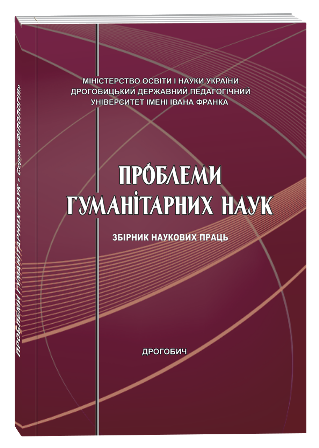THEMATIC GROUPS OF THE ASSOCIATIVE-MEANING FIELD OF THE WORDSTIMULUS RUSSIA DURING THE RUSSIAN-UKRAINIAN WAR
DOI:
https://doi.org/10.24919/2522-4565.2023.58.2Keywords:
associative-semantic field, word-stimulus russia, associative experiment, thematic group, the core and periphery of the associative-semantic field, the Russian-Ukrainian warAbstract
The article traces the peculiarities of the images of the linguistic picture of the world and the value orientations of Ukrainian society. The purpose of the study is to analyze the associative field of the word-stimulus russia in the conditions of the current Russian-Ukrainian war, based on the directed associative experiment method. As a result of the survey conducted among the students of the Lviv Polytechnic National University, 685 word-reactions to the russia stimulus word were found and the frequency of the associates use in the core (49%), near (30%) and distant periphery (21%) was determined. The core of the associative field contains the most relevant and stereotyped concepts of the mental lexicon: enemy 78, aggressor 54, swamp 51, bottom 32, rasha (rashka) 18, murderer 16, occupier 14, parasha (parashka) 13, invader 12, moskoviia 12, evil 11, mordor 11, hatred 11. In the associative field of the stimulus word russia, 15 thematic groups have been distinguished, including: 234 names of creatures, 105 names of the occupying country, 66 names of feelings, sensations, mental state of a person, 57 names of natural phenomena, 51 names of objectified actions, states, processes, 47 names of objects and their parts, 28 names of ideologies and forms of social government, 28 names of premises and institutions etc. It has been ascertained that the majority of the detected associates have negative meaning, which is the evidence of the disdainful attitude of the informants towards the aggressor country. A significant number of expressively marked names has been recorded, which indicates the dominance of the emotional level of images of consciousness over the mental one, as well as the maintenance of a certain balance between the objective and subjective images of the speakers' perception. Cognitive shifts have taken place in the minds of modern youth, which have formed verbal reactions to the word-stimulus. They reflect cognitive processes occurring at the mental level under the influence of perceptual experience and existing knowledge. The experimental material confirmed that the generalized perception of russia after the full-scale invasion of Ukraine shifted from neutral to threatening, and the specific perception made it possible to perceive russia as a real enemy participating in hostilities against our country.
References
Антиутопія. URL : https://uk.wikipedia.
Білодід І. К. (Ред.). Словник української мови : в 11 т. Київ : Наукова думка. 1970–1980.
Булик-Верхола С. З. Мовний образ Росії як ворога (на матеріалі ЗМІ періоду російсько-української війни). Закарпатські філологічні студії. 2022. Вип. 23. Т. 1. С. 29–33. DOI : 10.32782/tps2663-4880/2022.23.1.5.
Дробот О. В., Максименко Н. М., Фартушна С. О. Спрямований асоціативний експеримент: практика застосування у психологічному дослідженні свідомості. Психологія свідомості: теорія і практика наукових досліджень. 2019. С. 115–120.
Кушмар Л. Взаємовідношення між концептуальною та мовною картинами світу (на прикладі лексеми економічної сфери КЛІЄНТ). Psycholinguistics. 2019. Vol. 26. Issue 2. P. 164–180. DOI :10.31470/2309-1797-2019-25-2-164-180.
Мельничук О. С. (Ред.). Словник іншомовних слів. Київ : Головна редакція УРЕ АН УРСР, 1974.776 с.
Росія. URL : https://uk.wikipedia.
Теглівець Ю. В. Інтернет-мем як особлива одиниця комунікації. Закарпатські філологічні студії. 2022. Вип. 24. Т. 2. С. 23–27. DOI : 10.32782/tps2663-4880/2022.24.2.4.
Токарева Н. (2019). Моделювання асоціативно-семантичного контенту у логіко-смисловому вимірі мовлення підлітків. Psycholinguistics. 2019. Vol. 26. Issue 1. P. 324–341 DOI :10.31470/2309-1797-2019-26-1-324-341.
Zahorodnia O. F., Nedashkivska T. Ye. The associative field of a word as a multilingual structure (ваsed on the mass free associative experiment with ukrainian social and political lexis). Вісник Житомирського державного університету імені Івана Франка. Філологічні науки. 2019. Вип. 3 (91). С. 108–117.
Zsarnóczaiová Ž. Methodics of the associative experiment. Slavica Slovaca. 2020. № 55 (1). Р. 69–81.



